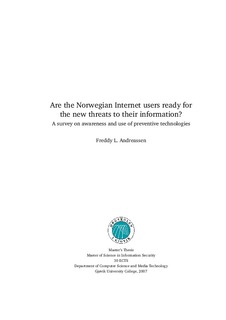| dc.contributor.author | Andreassen, Freddy L. | |
| dc.date.accessioned | 2007-11-21T10:14:34Z | |
| dc.date.issued | 2007 | |
| dc.identifier.uri | http://hdl.handle.net/11250/143773 | |
| dc.description.abstract | NORSK:
I en setting hvor teknologi, og dermed trusler mot denne teknologien, utvikler seg veldig
raskt, er det viktig for utviklere av nye tjenester som benytter seg av denne teknologien
og i større grad fokusere på de kravene brukerne setter til systemet. De fleste er oppmerksomme
på trusler mot våre konvensjonelle eiendeler, man setter for eksempel ikke
fra seg bilen ulåst om kvelden og de fleste tegner forsikringer for å beskytte verdien den
representerer. Men er folk oppmerksomme på at elektroniske verdisaker, i form av informasjon,
er like verdifulle for kriminelle på Internett?
Tjenester som Minside fra Norge.no, aggregerer mye informasjon på ett sted og gir brukerne
tilgang til denne. Vi mener dette kan gjøre brukerne mer attraktive for angripere. Vi
ser allerede denne type tilnærming hvor trojanere angriper enkeltbrukere av nettbank.
Tyveri av kontodetaljer og påloggingsinformasjon er en direkte tilnærming, med umiddelbar
gevinst i form av overførsel av tilgjengelige midler. Men hvis identitetstyverier
og sosial entrepenørkunst(social engineering) blir mer vanlig i Norge, så kan brukere av
informasjonsaggregerende tjenester som Minside bli populære mål.
Hvis brukerne får noe av ansvaret med å beskytte sin egen informasjon, bør ekstra fokus
rettes mot nettopp brukerne av tjenesten under identifiseringen av krav til tjenesten. Hvis
trenden med å angripe enkeltbrukere fremfor sentrale servere forsetter, bør designere av
slike tjenester forsikre seg om at brukerne er villige og i stand til å beskytte informasjonen
på egne datamaskiner. Hvis brukerne ikke er i stand til eller ikke er villige til å beskytte
datamaskinene sine tilstrekkelig, kan det hende de lar være å bruke tjenesten i isteden.
Denne masteroppgaven undersøkte hvor oppmerksomme norske Internett-brukere er på
områdene personvern og trusler mot datamaskiner koblet til Internett. I tillegg undersøkte
den bruk av sikkerhetstiltak som anti-virus, anti-spionprogramvare(spyware), brannmur
og sprett-opp-vindu(popup)-blokkerer. Fra studien av tidligere arbeid om fokus på
personvern fant vi at mange sier personvern er viktig, men lar være å følge opp når det
gjelder å benytte seg av personvernrettigheter og å aktivt beskytte sitt eget personvern.
I tillegg finner undersøkelser en veldig stor andel av private datamaskiner infiserte med
ondsinnet kode.
Fra vår undersøkelse og den etterfølgende analysen fikk vi bekreftet hvor viktig oppmerksomhet
på problemene er for bruk av sikkerhetstiltak. Vi fant også store forskjeller i bruk
av de forskjellige sikkerhetstiltakene vi spurte om. Nesten alle sier de bruker anti-virus,
mens bare omtrent halvparten av de spurte sier de bruker anti-spionprogramvare. | no |
| dc.description.abstract | ENGELSK:
In a setting where technology, and thus threats to this technology as well, evolves rapidly,
it is important for designers of new services utilizing this technology to address to a
greater extent the requirements the users of the services put on the system. Most are
aware of the threats to conventional valuables, e.g. we do not leave our car unlocked in
the street at night and most invest in insurance to protect the value it represents. But are
people aware that their electronic valuables, in the form of information, are also prized
targets for online criminals?
With services like Mypage(Minside) that aggregate much information and makes it available
to the users, we see a shift in the responsibility for protecting this information. We
argue that this development could make the uses more attractive to attackers, we are
already seeing this with trojans attacking individual users of Internet banking. The stealing
of financial information is a direct approach, with the instant transfer of available
funds in accounts. But if identity theft and social engineering becomes more common in
Norway, we could see users of information aggregating services like Mypage becoming
prime targets for attackers looking for information on targets.
If the users are responsible for protecting the information on their computers, it is necessary
to put more focus on the users when identifying the system requirements. If the
trend of attacking individual users rather than the central servers is continuing, the designers
of such systems should make sure that the users are capable and willing to take
the responsibility for protecting the information on their own computers. If users are not
capable or willing to make effort of protecting their computers, they might choose not to
use the service instead.
This thesis investigated levels of awareness towards privacy and threats to an online computer,
and in addition the use of preventive technologies such as anti-virus, anti-spyware,
firewall and popup-blocker. From the study of previous work on privacy awareness, we
found many stating privacy is important, but not putting words into action when it comes
to exercising privacy rights or actively protecting their privacy. In addition, recent surveys
on malicious software show a very large part of consumer PCs infected.
From our survey and subsequent analysis we confirmed the importance of awareness in
explaining use of preventive technologies. We also found the extent of preventive technology
use, with both good and bad news. We saw an almost universal use of anti-virus
among our survey respondents, but only approximately half of the people asked use
anti-spyware. | en |
| dc.format.extent | 822051 bytes | |
| dc.format.mimetype | application/pdf | |
| dc.language.iso | eng | en |
| dc.subject | informasjonssikkerhet | en |
| dc.subject | software | en |
| dc.subject | datasikkerhet | en |
| dc.subject | datavern | en |
| dc.title | Are the Norwegian Internet users ready for the new threats to their information?: a survey on awareness and use of preventive technologies | en |
| dc.type | Master thesis | en |
| dc.subject.nsi | VDP::Mathematics and natural science: 400::Information and communication science: 420::Security and vulnerability: 424 | en |
